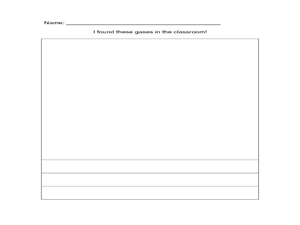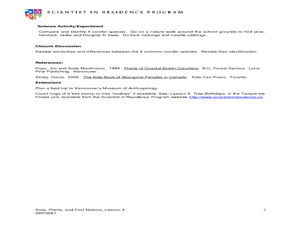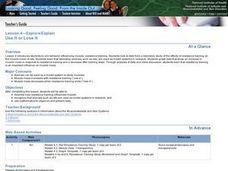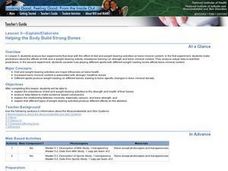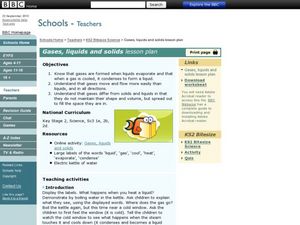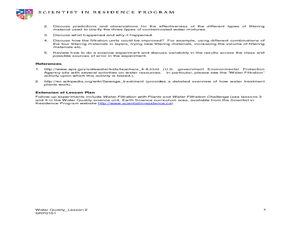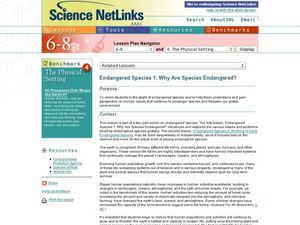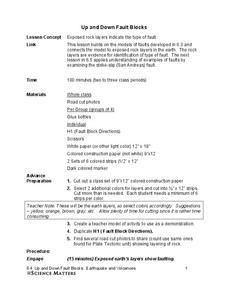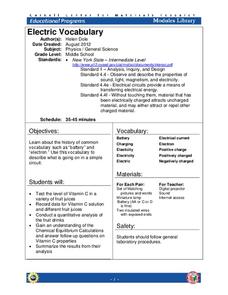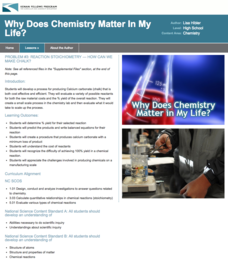Curated OER
Matter: Solids Liquids and Gases
Young scholars participate in a science experiment to understand that matter takes up space. For this matter lesson, students experiment with solids, liquids and gases to recognize that matter is everywhere. Young scholars make...
Curated OER
Chromatography of Foods
High schoolers complete a counter top chemistry experiment on the chromatography of foods. The experiment is based upon the relative attraction of the components of the mixture for the mobile phase (water) and the stationery phase (paper).
Curated OER
The Human Organism
In this digestion and nutrition lesson plan, 3rd graders test foods to find their vitamin content. Students test for starch and fats then compare their findings on charts and oral reports. The lesson plan concludes with a teacher...
Curated OER
Forest Food Chains and Webs
Students explore forest ecological systems. In this ecology lesson, students classify forest plants and animals according to their ecological roles. Students play a related vocabulary guessing game. Students choose a card on which...
Curated OER
Western Red Cedar
Learners explore the First Nations uses of the Western Cedar tree. In this nature lesson students compare and identify four conifer species. The learners go on a nature walk.
Curated OER
Use It or Lose It
Young scholars explore the effects of resistance training on the muscles. Data on the muscle mass of rats is examined is graphed to determine any increase in mass due to training.
Curated OER
Helping the Body Build Strong Bones
Students explore the effects of diet and weight-bearing activities on bone mineral content. The influence of playing a variety of sports with different weight-loading levels is examined.
Curated OER
The Magic School Bus Wet All Over
Students observe the water cycle and experiment with cleaning water. In this hands-on hydrology lesson based on a Magic School Bus book, students conduct two experiments to see the how water moves through the water cycle and then they...
Curated OER
Gases, Liquids and Solids, evaporate, shape volume,
Students conduct an online experiment to discover what happens to solids, liquids and gases in different temperatures. In this states of matter lesson, students get into pairs and work in a virtual laboratory to manipulate...
Curated OER
What is an Earthworm Like?
Second graders study earthworms. In this science instructional activity, 2nd graders observe an earthworm using a magnifying lens, draw pictures of the earthworm, and record their observations.
Curated OER
Elaine Humphrey, Gwynne Thompson
Second graders become familiar with the parts of the microscope and how it works. In this microscope lesson, 2nd graders experiment with different light and settings. Students answer questions based on their experiment.
Curated OER
Water Quality: Water Filtration
Learners build a water filtration system. In this water quality lesson, students work in groups to construct water filtration units that can purify contaminated water. This lesson is part of a larger unit on water quality.
Curated OER
Water filtration with Plants
Sixth graders explain how soil and plants effect contaminated water in nature. In this filtration lesson plan, 6th graders work in groups to test biofiltration units. Students determine which biofiltration units work best and how...
Curated OER
Circuit Boards
Students explore circuits. In this electricity science lesson, students build a circuit board after viewing a related PowerPoint presentation. Detailed instructions are included.
Curated OER
Trees and Erosion
Students examine the connection between trees and erosion. In this erosion activity students experiment with the effects of rain on a hillside. Students investigate the number of trees and the amount of erosion.
Curated OER
Read, Write and Talk
Fourth graders explore electricity by reading a story in their class. In this research technique lesson, 4th graders read a Magic School Bus book together and decide which elements of the story are the most important when asked about...
Curated OER
Endangered Species 1: Why are Species Endangered?
Emerging ecologists examine endangered species by visiting the US Environmental Protection Agency website. They consider human contribution to the decline of different species. They research an endangered animal and then craft a poster...
Curated OER
Nellie Bly's Newspaper Club: Introducing the Science of Writing
Young scholars evaluate a video about Nellie Bly, a famous reporter from the 19th century. They consider what makes a high-interest news article, write an essay in pairs and present it a literary tea.
Science Matters
Up and Down Fault Blocks
The Sierra Mountains in Nevada and the Tetons in Wyoming originally formed as fault block mountains. In order to visualize these fault blocks, pupils use construction paper to create layers of earth. They cut the paper models and form...
Fuse School
Quiz: Emulsions
Ready to mix it up? Learners step up to the plate and show what they know in the 12th installment of a 14-part series covering the states of matter. The quiz contains four questions testing the basics of emulsion chemistry.
Cornell University
Electric Vocabulary
Practice electric vocabulary using multiple methods. Learners begin by watching a video that explains vocabulary related to electric currents. They match vocabulary cards to practice and then create an electric circuit. Using the...
Exploratorium
Cheshire Cat
Divide your field of vision in two and see what happens when your two eyes behold two different scenes! This is a way to demonstrate to body-systems buffs how the two eyes usually blend pictures to create a three-dimensional view. This...
Center for Learning in Action
Investigating Physical and Chemical Changes
Super scientists visit ten stations to predict, observe, and draw conclusions about the physical and chemical changes that occur when different states of matter—liquid, solid, and gas—are placed under a variety of conditions. To...
Kenan Fellows
Reaction Stoichiometry—How Can We Make Chalk?
What is a reasonable percent yield in the manufacturing process? Scholars develop a process for producing chalk in the third lesson plan of a six-part series. Then, they must determine the theoretical and percent yield. Discussions about...


